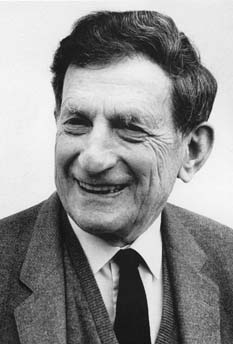David Bohm's "Wholeness and the Implicate Order" is a curious
book. Modern quantum physics meet Henri Bergson, Advaita Vedanta and presumably
Jiddu Krishnamurti. Some sections of the book are so technical than I don't
understand them. Others sound like new agey flim flam. Bohm was a world-renown
scientist, but he also had a longstanding friendship with Krishnamurti,
self-defrocked Theosophist and spiritual teacher in the Hindu-Buddhist vein.
What Bohm calls "the implicate order" or the
"holomovement", a Hindu would presumably call Brahman. In Bohm's more
Bergsonian version, the holomovement is constantly evolving, implying that
somehow humanity can evolve further, too. (Note the Theosophical antecedents
for this idea.)
To Bohm, both matter, life and consciousness arise from the holomovement, which is itself neither. Curiously, Bohm's speculations are on some points more "rational" than official quantum physics (the Copenhagen interpretation), since he attempts to explain various bizarre quantum phenomena by deriving them from a higher order of reality, which is open to scientific exploration, at least up to a certain point. The seemingly "occult" behaviour of atoms and particles in standard quantum physics could thus be explained as caused by the implicate order. Mystery solved. On the web, I found some "sceptics", read atheists or agnostics, who are interested in Bohm precisely for this reason, since they consider the Copenhagen interpretation to be down-right irrational. It's therefore ironic that Bohm himself was looking for Brahman!
Bohm's metaphysics could be regarded as pantheist, panpsychist or perhaps panentheist. "Our" reality is an abstraction or holographic projection of the implicate order. It looks dualist or fragmented, but on a deeper level, we are all part of a seamless Whole. Bohm speculates that the implicate order might itself be a sub-set of an even deeper order of which we can say nothing. Of course, in Hinduism such a statement implies mysticism, and Bohm often uses terms I associate with meditation (right attention, etc). By expanding our consciousness, we could overcome our fragmentation and create a peaceful world community in harmony with Nature. Or so Bohm believes. These themes are only hinted at, however, since the book is supposed to be a scientific treatise.
When I read "Wholeness and the Implicate Order", I was struck by the fact that my own opinions have been roughly similar to those of Bohm for as long as I can remember - and yet, I regarded myself as a materialist until a few years ago! My "materialism" was in reality an implicit (implicate?) evolutionary panpsychism. Amen. However, I can also sense some problems with Bohm's position. How is "abstraction" and fragmentation possible at all, if reality is a seamless whole? The Eastern philosophies can't explain this jump from monism to pluralism either, except by suggesting that Maya is indeed inscrutable. Presumably, we'll all stop asking awkward questions once we get the mystical Insight.
Still, it's interesting that Bohm believed that at least part of the non-materialist, implicate order can be proved by modern science.

No comments:
Post a Comment